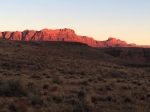Silence and Solitude
Silence and solitude live as natural partners. Inner and outer silences have their counterparts in inner and outer solitudes. Until a century ago, the world’s peoples enjoyed true silences and real solitudes more than now. Most of us live in a world of noises, voices, and sounds. Daily, other people invade our private space physically, mentally, and emotionally through the television and internet. Where do we find silence? Most of us get out of town and head for a national park, a lodge, a retreat. However, even the wildernesses of national parks and forests pulsate with sounds, voices, disturbances. Where are true silence and solitude?
I think of silence as a personal attribute, a capacity innate to each of us. The way in which we use and work with our sense of silence shapes an aspect of our personality. When I’m truly silent, I find the important, intimate words to direct toward others. When I’m angry, troubled, or perplexed, I unconsciously try to avoid inner silence. In my fear, I don’t want silence because it is the place within where I must release control over my life. Sometimes I’d rather not let go.
In the course of life, I’ve encountered silence in many forms and guises. I’m not referring to the absence of sound in a chamber, the dead air of nothingness in an abandoned house. That’s external silence. I’m speaking of internal silence and solitude.
When the cry of the oppressed goes unheeded, I hear silence. When I suppress my outrage at injustice, I hear silence. When I fail to rebut the lies about others, I hear silence. When I rationalize my indifference to the poor, I hear silence. This is the silence of my own evil.
There are also positive forms of silence. When my being is silent, I hear my heart beat; it beats as a rhythmic organ of my body, and it beats with the truth of my being. It’s hard to hear the inner heart when I focus chiefly on my needs. I need solitude to hear the small quiet voice of my conscience. Within deep silence, it’s possible to let go of external things and see myself as I am with greater clarity. This is the silence feared by dictators, totalitarians, and oppressors. It is the silence outside the claims of state and ideology. Our inner silence isn’t and can’t be under external control unless we permit it.
I’m an introvert who hungers for silence and solitude. Both are sources of my energy and direction. My extroverted friends find their energy and direction through associating with others. Their sense of silence and solitude differs from mine. American culture treats extroversion as ideal, a social good. Our extroverted society often treats introverts as asocial, and reacts to our and solitude with suspicion because they believe the silent, solitary ones are hiding something. We aren’t hiding anything—we are being ourselves.
Thomas Merton mediated on silence and solitude. In The Wisdom of the Desert, he wrote of the early Coptic Christian monks—the Desert Fathers—who “…sought most of all … their own true self…” He elaborated this theme succinctly in his meditation, Thoughts in Solitude: “The solitary life, being silent, clears away the smoke-screen of words that man has laid down between his mind and things. In solitude we remain face to face with the naked being of things.”
For this, we need silence. Silence is the soul of solitude, it is the fullness of sound where listening is more potent than hearing. In silence, I hear the voice of my being, my true self. In silence, I know I am more than the persona reflected for the benefit of others. My silence, your silence, they are a presence, a tangible yet invisible attribute we share with the entire cosmos. Our inner silence possesses weight and gravity that anchors us inside ourselves. We all feel the silence at times. It is the ground of our being.


